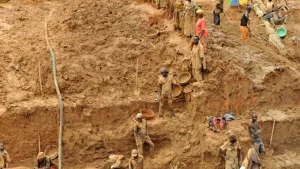
The Federal Government has opposed a Senate bill recommending support to create the Nigeria Mines Rangers Service to combat illegal mining, arguing that such a move would duplicate efforts and potentially disrupt the work of existing security agencies.
The FG’s position was voiced during a public hearing on the bill, sponsored by Onawo Ogoshi, a senator representing Nasarawa South. The hearing was organised by the Senate committee on solid minerals on Thursday.
Oladele Alake, the minister of solid minerals development, pointed to the existence of a specialised Mines Surveillance Task Force, set up by the government, comprising all relevant security agencies working together to monitor various aspects of illegal mining.
Alake, represented by Umar Bala from the ministry’s mines inspectorate department, noted that the task force allows for synergy and intelligence-sharing among agencies, an approach he believes is essential in effectively tackling illegal mining.
“The special mine surveillance task force comprises more security agencies who operate under the coordination of the National Security Advisor under the supervision of the ministry of solid mineral development.
“It offers the best option as an integrated approach to combating illegal mining activities. If the government does not collaborate and share intelligence as an integrated approach, effectively combating illegal mining could be elusive”, he said.
“I call on the Senate committee to consider and adopt the special Mines Surveillance Task Force and its standard operation procedure as a better alternative to Nigerian Mines Ranger Service because the mine surveillance task force comprises all the security agencies and they work together to tackle the issue of illegal mining activities across the nation”, he added.
In addition to maintaining the task force, the minister suggested the deployment of technology and the adoption of non-kinetic approaches to support current efforts.
“The deployment of technology such as unmanned aerial vehicles or drones specifically targeted to the mining sector can complement the current kinetic approach of surveillance by providing real-time information in digital format”, he added.
Geraldine Okafor, an assistant director at the ministry of interior, also voiced opposition to the proposed agency, arguing that creating a new body would duplicate existing functions. She advocated, instead, better resourcing and training of the Civil Defence Corps to enhance their effectiveness.
“The ministry is of the view that if the existing agencies, especially the Civil Defence Corps well equipped, trained along with other mines task force, they can do a lot of this work rather than duplicating this assignment”, Okafor stated.
Ahmed Audi, commandant general of the Nigeria Security and Civil Defence Corps (NSCDC), joined the opposition to the bill, contending that it overlaps with the corps’ existing mandate.
He argued that the corps already has a specialised unit trained by the military to provide security at mining sites and warned that the bill could infringe upon these responsibilities.
“We are strongly opposed to the provision of this bill as presently constituted. We vehemently hold that the proposed establishment of the Nigerian Mines Rangers and their function is an infringement in the core mandate of NSCDC. The bill is not just a duplication of the NSCDC Act and its mandate, it is also an attempt to usurp the mandates that are still given to the corps, and in a disguised way, handing it over to the police through the back.
He cited Section 3 of the establishing Act which empowers the corps to combat industrial espionage and fraud, syndicated activities aimed at defrauding the federal government or defrauding or frustrating any of its programs or policies.
Audi further boasted that the corps has made significant strides in addressing illegal mining, highlighting the achievements of the well-trained mining marshals selected from the Special Forces Department. According to him, the corps has destroyed over 100 illegal mining sites, arrested more than 50 suspects, including foreign nationals, and currently has over 30 cases in court.
In response, Ogoshi, the bill’s sponsor, defended the proposal, arguing that existing agencies have not been effective in curbing illegal mining, which continues to deprive the nation of revenue.
Ogoshi emphasised the need for a more robust approach, especially as Nigeria seeks to diversify its economy away from oil dependency. He added that the proposed Rangers Service could also provide employment opportunities.










